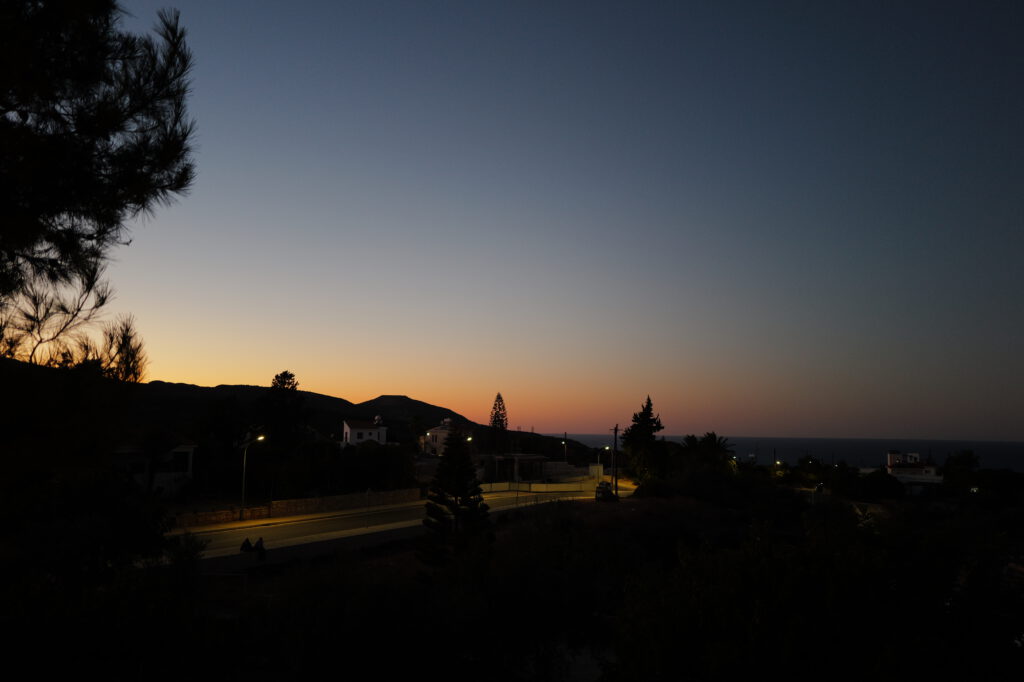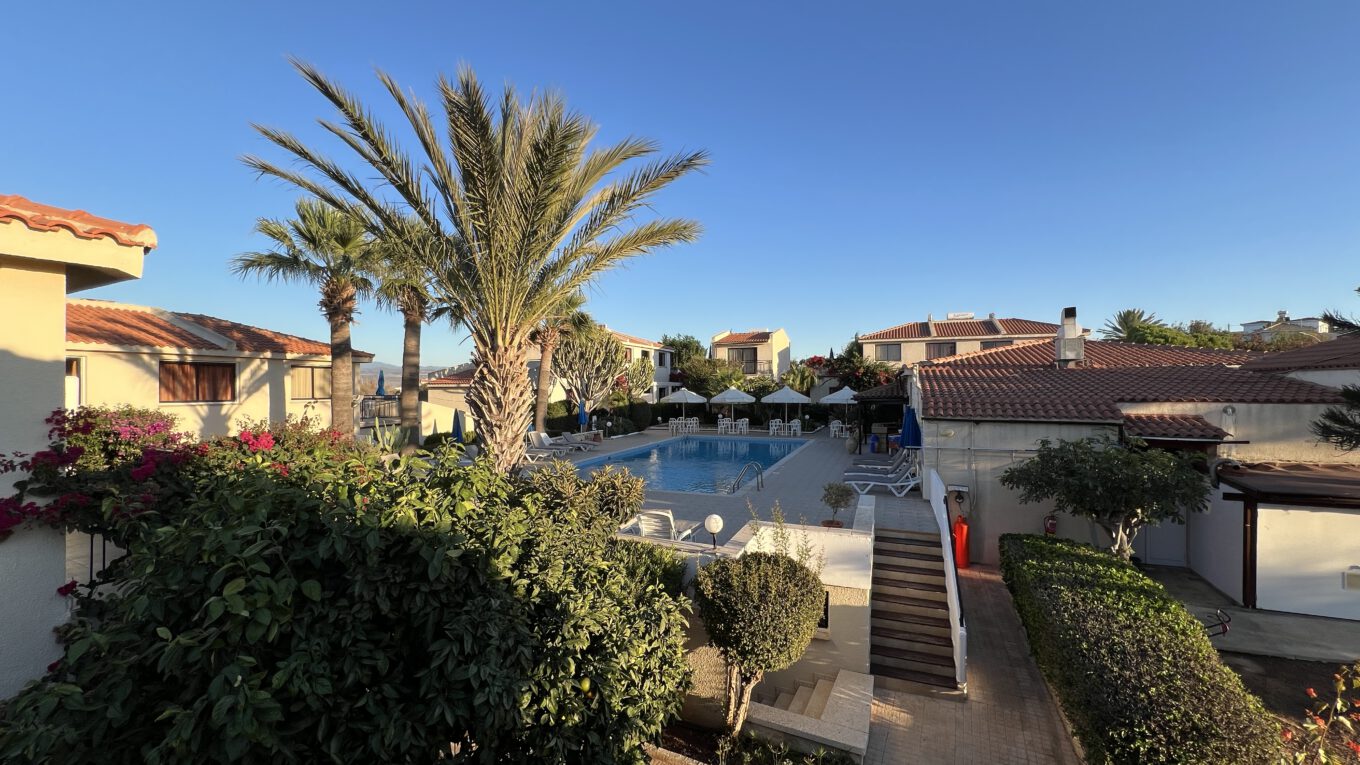Reise nach Zypern – Ein Abenteuer beginnt
Es war, als ob die feuchte norddeutsche Kälte mich nicht loslassen wollte. Dabei hatte alles so vielversprechend begonnen. Um 3:15 Uhr war ich wach, schaltete den Wecker ab, gönnte mir eine kurze Katzenwäsche und genoss ein entspanntes Frühstück mit Cappuccino und Müsli. Kurz nach vier verließ ich das Haus. Ein leichter Regen begleitete mich. Der Zug traf pünktlich um 4:19 Uhr ein, doch bis Pinneberg sammelte er zwei Minuten Verspätung auf. Eigentlich kein Drama – wenn der Flughafenbus nicht genau dann abfahren würde, wenn die Fahrgäste aus den Kreisen Dithmarschen und Steinburg gerade ankommen.
Der Bahnhof Pinneberg glich einer Baustelle. Wer zum Ausgang wollte, musste erst einmal an Bauzäunen vorbei in die entgegengesetzte Richtung des Busbahnhofs laufen. Aber ich mache es kurz: Der Bus fuhr mir genau drei Minuten vor der Nase weg. Also blieb mir nichts anderes übrig, als ein Taxi zu nehmen. 51 Euro später stand ich am Hamburger Flughafen.
Das Einchecken verlief erfreulich reibungslos. Ich konnte meinen Koffer in Sekundenschnelle selbst aufgeben und direkt zur Sicherheitskontrolle gehen. „Wir müssen einen Sprengstofftest mit der Kamera machen. Oha, die ist ja ziemlich stabil.“ Merke: stabile Kameras sind verdächtig gefährlich.
Warten am Gate
Am Gate verbrachte ich anderthalb Stunden. Eine Stunde, weil das Einchecken so schnell ging, und weitere 30 Minuten, weil der Tankwagen angeblich zu spät kam. (Das wäre doch auch mal eine schöne neue Verspätungsentschuldigung für die Bundesbahn.) Der Abflug verzögerte sich um 30 Minuten, die wir bis Wien aber fast wieder einholten – nur 20 Minuten später als geplant landeten wir.
Wien als Umsteigepunkt war eine Premiere für mich. Beim nächsten Mal werde ich vorher ein wenig für den 10-km-Lauf trainieren – vor 50 Jahren wäre das kein Problem gewesen. Vom hinteren Ende von Terminal F nach G16 in unter 10 Minuten zu sprinten und dabei noch die Passkontrolle zu meistern, war sportlich. Immerhin zeigte mir meine Apple-Watch, dass ich bis 9:40 Uhr alle Trainingsziele des Tages erreicht hatte – außer dem „Steh-Ring“.
Ankunft auf Zypern und erste Eindrücke
Die drei Stunden Flugzeit von Wien nach Larnaka verschlief ich. Gut so, denn so konnte ich ausgeruht und entspannt mit dem Leihwagen die 172 km vom Flughafen bis zu meinem Appartement-Hotel nahe Latsi und Polis fahren. Auf Zypern herrscht Linksverkehr, aber das bereitet mir keine Probleme, solange das Lenkrad auf der rechten Seite ist. Die Autobahnen sind ein Genuss – entspannte Fahrt bei Tempo 100. Anders sieht es bei Landstraßen aus.
An der Rezeption erwartete mich Dora. Eine Seele von Frau – freundlich, hilfsbereit und interessiert an ihren Gästen. Sie zeigte mir mein Appartement: Wohnzimmer, Schlafzimmer, Küche, Bad und eine große Dachterrasse. Von dort blickte ich Richtung Norden auf das tiefblaue Meer vor Latsi und Richtung Südost auf den Hotelpool. Dora empfahl mir, im Supermarkt in Latsi einzukaufen, was ich auch tat. Vielleicht würde ich später noch in eine Taverne gehen, um den Abend gemütlich ausklingen zu lassen.
Gespräche und Einblicke – Die Realität hinter der Idylle
Ich sprach kurz mit Dora über unsere nepalesischen Patenkinder, die angeblich als Au-pair-Mädchen hier arbeiten. Doch Dora stellte klar: wahrscheinlich sind sie als „Domestic Workers“ hier, was ihnen erlaubt, zeitlich unbegrenzt als Hausangestellte zu arbeiten. Auf Zypern können Familien, Alleinerziehende, Einzelpersonen und ältere Menschen Frauen aus Drittländern als Haushaltshilfen beschäftigen, in Ausnahmefällen auch Männer. Voraussetzung sind Grundkenntnisse in Griechisch oder Englisch. Zahlt der Arbeitgeber nur den gesetzlichen Mindestlohn, bleiben den Beschäftigten nach Abzügen gerade einmal 299 Euro im Monat: Ausgehend von einem Bruttogehalt von 460 Euro, abzüglich Sozialversicherungsbeiträgen sowie 15 % für Verpflegung (69 Euro) und 10 % für Unterkunft (46 Euro). Die nepalesische Agentur, die unsere Patenkinder vermittelte, kassierte dafür stolze 3.000 Euro pro Person.
In den nächsten Tagen will ich Yeshi und Lekshey Raum für ihre Geschichten geben und sie ermutigen, sie in Worte und Bilder zu kleiden.

Zwischen Erholung und Reflexion
Die Reise nach Zypern begann mit einem ungewollten Sprint und einem teuren Taxi, doch am Ziel angekommen, war es entspannter, als ich es mir erträumt hatte. Die Gespräche mit Dora öffneten mir die Augen für eine andere Realität, die hinter der Urlaubsidylle lauert. Das System der „Domestic Workers“ ist ein Beispiel für globale Ungleichheiten, modernen Sklavenhandel, die wir im Alltag oft übersehen. Ich frage mich, wie viele Geschichten hinter den Kulissen meiner Reise ungehört bleiben. Aber heute Abend werde ich erst einmal das zypriotische Essen genießen, den Blick aufs Meer und die Ruhe, die mir der Tag schließlich doch noch gebracht hat.
Travelling to Cyprus – An adventure begins
It was as if the damp north German cold would not let go of me. Yet everything had started so promisingly. I was awake at 3.15am, switched off the alarm clock, gave myself a quick wash and enjoyed a relaxed breakfast of cappuccino and muesli. I left the house shortly after four. A light rain accompanied me. The train arrived on time at 4.19am, but it was two minutes late to Pinneberg. Not really a big deal – if the airport bus didn’t leave just as the passengers from the Dithmarschen and Steinburg districts were arriving.
Pinneberg station resembled a building site. If you wanted to get to the exit, you first had to walk past construction fences in the opposite direction to the bus station. But I’ll make a long story short: the bus left exactly three minutes before I did. So I had no choice but to take a taxi. 51 euros later, I was at Hamburg airport.
Checking in went pleasantly smoothly. I was able to check in my suitcase myself in a matter of seconds and go straight to security. ‘We have to do an explosives test with the camera. Oh well, it’s pretty stable.’ Remember: stable cameras are suspiciously dangerous.
Waiting at the gate
I spent an hour and a half at the gate. An hour because check-in was so quick, and another 30 minutes because the petrol tanker was supposedly late. (That would be a nice new excuse for the Bundesbahn). The departure was delayed by 30 minutes, but we almost made up for it by the time we reached Vienna – we landed just 20 minutes later than planned.
Vienna as a transfer point was a first for me. Next time I will train a little for the 10 km run beforehand – 50 years ago that would have been no problem. Sprinting from the far end of Terminal F to G16 in under 10 minutes and getting through passport control at the same time was quite a feat. At least my Apple Watch showed me that I had achieved all my training goals for the day by 9.40am – except for the ‘standing ring’.
Arrival in Cyprus and first impressions
I slept through the three-hour flight from Vienna to Larnaca. That was good, because it meant I could drive the 172 kilometres from the airport to my flat hotel near Latsi and Polis in my hire car, rested and relaxed. Cyprus has left-hand traffic, but that doesn’t cause me any problems as long as the steering wheel is on the right-hand side. The motorways are a pleasure – a relaxed drive at 100 km/h. Country roads are a different story.
Dora was waiting for me at reception. A soul of a woman – friendly, helpful and interested in her guests. She showed me my flat: living room, bedroom, kitchen, bathroom and a large roof terrace. From there, I could see the deep blue sea off Latsi to the north and the hotel pool to the south-east. Dora recommended that I go shopping at the supermarket in Latsi, which I did. Perhaps I would go to a taverna later to round off the evening in a cosy atmosphere.
Conversations and insights – the reality behind the idyll
I spoke briefly with Dora about our Nepalese sponsored children, who were supposedly working here as au pairs. But Dora clarified: they are probably here as ‘domestic workers’, which allows them to work as domestic servants for an unlimited period of time. In Cyprus, families, single parents, individuals and older people can employ women from third countries as domestic workers, and in exceptional cases also men. A basic knowledge of Greek or English is required. If the employer only pays the statutory minimum wage, the employees are left with just 299 euros a month after deductions: based on a gross salary of 460 euros, minus social security contributions and 15% for food (69 euros) and 10% for accommodation (46 euros). The Nepalese agency that arranged our sponsored children collected an impressive 3,000 euros per person.
Over the next few days, I want to give Yeshi and Lekshey space to tell their stories and encourage them to put them into words and pictures.
Between relaxation and reflection
The journey to Cyprus began with an unintentional sprint and an expensive taxi, but once I arrived at my destination, it was more relaxed than I had dreamed. The conversations with Dora opened my eyes to another reality lurking behind the holiday idyll. The system of ‘domestic workers’ is an example of global inequalities, modern slave trade, which we often overlook in everyday life. I wonder how many stories remain unheard behind the scenes of my trip. But tonight I’m going to enjoy the Cypriot food, the view of the sea and the peace and quiet that the day has finally brought me.
